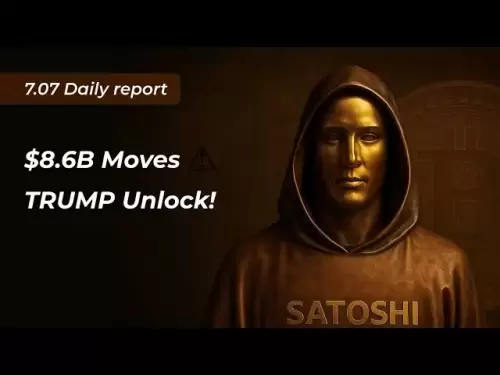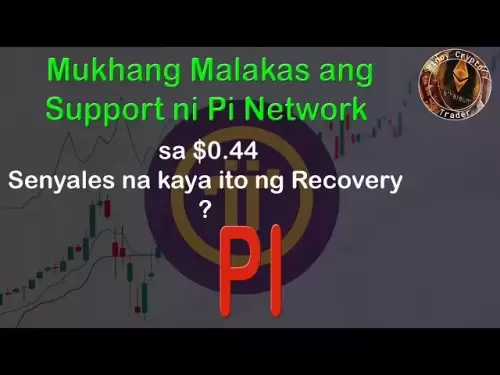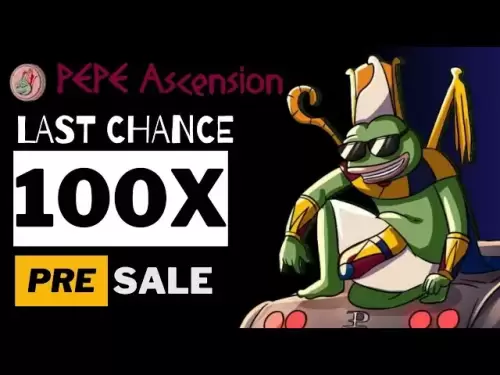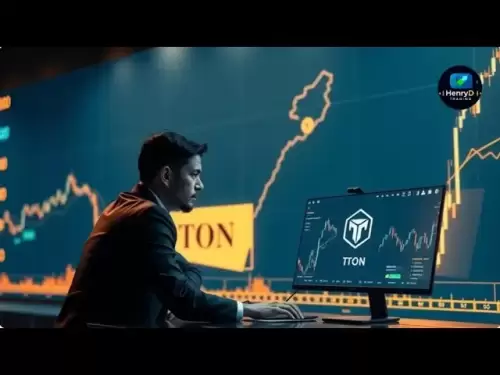-
 Bitcoin
Bitcoin $108,708.8110
0.60% -
 Ethereum
Ethereum $2,561.6057
1.91% -
 Tether USDt
Tether USDt $1.0001
-0.03% -
 XRP
XRP $2.2795
0.57% -
 BNB
BNB $662.2393
1.00% -
 Solana
Solana $153.1346
3.74% -
 USDC
USDC $1.0000
0.00% -
 TRON
TRON $0.2877
0.97% -
 Dogecoin
Dogecoin $0.1710
3.93% -
 Cardano
Cardano $0.5871
1.61% -
 Hyperliquid
Hyperliquid $39.6663
1.68% -
 Sui
Sui $2.9032
0.79% -
 Bitcoin Cash
Bitcoin Cash $496.1879
1.71% -
 Chainlink
Chainlink $13.5807
3.01% -
 UNUS SED LEO
UNUS SED LEO $9.0777
0.61% -
 Stellar
Stellar $0.2514
4.51% -
 Avalanche
Avalanche $18.1761
1.86% -
 Shiba Inu
Shiba Inu $0.0...01173
1.72% -
 Toncoin
Toncoin $2.8010
-4.23% -
 Hedera
Hedera $0.1594
3.21% -
 Litecoin
Litecoin $87.0257
-0.53% -
 Monero
Monero $319.1217
1.79% -
 Polkadot
Polkadot $3.3853
0.68% -
 Dai
Dai $0.9999
-0.01% -
 Ethena USDe
Ethena USDe $1.0003
0.02% -
 Bitget Token
Bitget Token $4.3420
-0.97% -
 Uniswap
Uniswap $7.3772
1.39% -
 Aave
Aave $286.6277
5.61% -
 Pepe
Pepe $0.0...09994
2.33% -
 Pi
Pi $0.4589
1.76%
What is the difference between spot trading and futures trading on Kraken?
Spot trading on Kraken involves immediate crypto exchanges, while futures trading uses contracts to speculate on future prices with leverage, increasing both risk and potential gains.
Apr 25, 2025 at 09:21 am
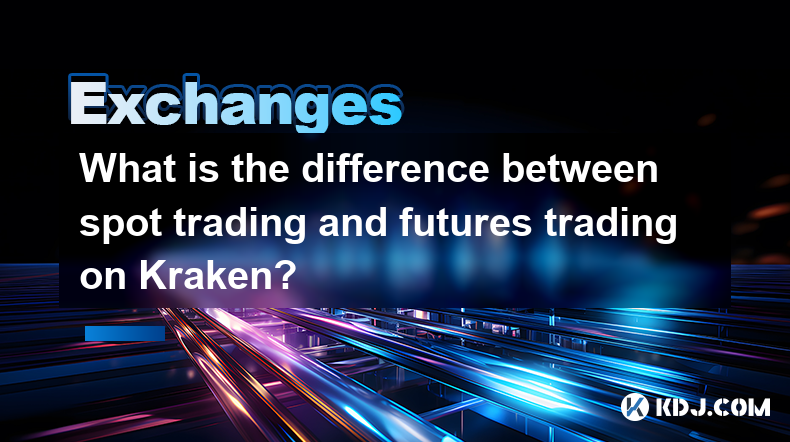
Spot trading and futures trading are two distinct methods of trading cryptocurrencies on platforms like Kraken. Each method has its own set of features, risks, and benefits. Understanding the differences between these trading types is crucial for any trader looking to navigate the cryptocurrency markets effectively.
What is Spot Trading?
Spot trading involves the immediate exchange of cryptocurrencies or fiat currencies for another at the current market price. When you engage in spot trading, you buy or sell assets instantly, and the transaction is settled right away. This type of trading is straightforward and is often preferred by those who wish to own the actual cryptocurrency.
In spot trading on Kraken, you can trade a variety of cryptocurrencies against each other or against fiat currencies like USD or EUR. The process is simple: you place an order to buy or sell at the current market price or at a price you specify, and if the order is filled, the transaction is complete.
What is Futures Trading?
Futures trading, on the other hand, involves trading contracts that obligate the buyer to purchase, and the seller to sell, a specific asset at a predetermined future date and price. Futures contracts on Kraken allow traders to speculate on the future price of cryptocurrencies without needing to hold the underlying asset.
Futures trading on Kraken is more complex than spot trading. It involves leverage, which means traders can control a larger position with a smaller amount of capital. However, this also increases the potential for both gains and losses. Futures contracts have expiration dates, and traders must be aware of these dates to manage their positions effectively.
Key Differences Between Spot and Futures Trading
The primary difference between spot and futures trading lies in the nature of the transaction. Spot trading is about immediate exchange, while futures trading is about speculating on future prices. Here are some key differences:
- Ownership: In spot trading, you own the cryptocurrency you purchase. In futures trading, you are trading contracts and do not own the underlying asset.
- Settlement: Spot trades settle immediately, whereas futures contracts settle at a future date.
- Leverage: Futures trading often involves leverage, allowing traders to amplify their exposure to the market. Spot trading typically does not involve leverage.
- Risk: Futures trading can be riskier due to leverage and the potential for significant losses. Spot trading is generally considered less risky as you are dealing with the actual asset.
How to Engage in Spot Trading on Kraken
To start spot trading on Kraken, follow these steps:
- Sign up for a Kraken account: Visit the Kraken website and complete the registration process.
- Verify your account: Complete the necessary verification steps to comply with Kraken's KYC (Know Your Customer) requirements.
- Deposit funds: Add funds to your Kraken account using one of the supported deposit methods.
- Navigate to the trading page: Go to the spot trading section of the Kraken platform.
- Select a trading pair: Choose the cryptocurrency pair you want to trade, such as BTC/USD.
- Place an order: Decide whether you want to place a market order (at the current market price) or a limit order (at a specified price). Enter the amount you wish to buy or sell and submit the order.
How to Engage in Futures Trading on Kraken
Engaging in futures trading on Kraken involves a few more steps and considerations:
- Sign up for a Kraken Futures account: If you don't already have one, sign up for a Kraken Futures account, which is separate from the spot trading account.
- Verify your account: Complete the verification process for the futures account.
- Deposit margin: Add funds to your futures account as margin, which will be used to open positions.
- Navigate to the futures trading page: Go to the futures trading section of the Kraken platform.
- Select a futures contract: Choose the cryptocurrency futures contract you want to trade, such as BTC futures.
- Place an order: Decide on the type of order you want to place (market, limit, stop, etc.). Specify the size of the position and the leverage you want to use. Submit the order.
Risks and Benefits of Spot Trading
Spot trading offers several benefits, including:
- Simplicity: Spot trading is straightforward and easy to understand.
- Ownership: You own the cryptocurrency you purchase, which can be held long-term or used for other purposes.
- Lower risk: Since you are not using leverage, the risk of significant losses is lower compared to futures trading.
However, there are also risks associated with spot trading:
- Market volatility: Cryptocurrency prices can be highly volatile, leading to potential losses.
- Liquidity: Some cryptocurrencies may have lower liquidity, making it harder to buy or sell at desired prices.
Risks and Benefits of Futures Trading
Futures trading comes with its own set of benefits:
- Leverage: Traders can control larger positions with less capital, potentially leading to higher returns.
- Hedging: Futures can be used to hedge against price movements in the spot market.
- Flexibility: Futures contracts offer more trading strategies, such as going long or short.
However, the risks of futures trading are significant:
- Leverage risk: While leverage can amplify gains, it can also amplify losses, potentially leading to significant financial loss.
- Complexity: Futures trading requires a good understanding of the market and the mechanics of futures contracts.
- Margin calls: If the market moves against your position, you may face margin calls, requiring you to add more funds to your account.
Choosing Between Spot and Futures Trading
Deciding whether to engage in spot trading or futures trading on Kraken depends on your trading goals, risk tolerance, and experience level. Spot trading is suitable for those who want to own cryptocurrencies and are looking for a simpler trading experience. Futures trading is better suited for experienced traders who are comfortable with higher risk and want to leverage their positions.
Frequently Asked Questions
Q: Can I switch between spot and futures trading on Kraken easily?
A: Yes, you can switch between spot and futures trading on Kraken, but you will need separate accounts for each. You can transfer funds between your spot and futures accounts, but be aware of any fees associated with these transfers.
Q: Are there any fees associated with spot and futures trading on Kraken?
A: Yes, Kraken charges fees for both spot and futures trading. Spot trading fees are typically based on the trading volume and can be found in Kraken's fee schedule. Futures trading fees include both trading fees and funding fees for holding positions overnight.
Q: Can I use the same funds for both spot and futures trading on Kraken?
A: No, you cannot use the same funds directly for both spot and futures trading. You need to transfer funds between your spot and futures accounts if you want to use them for different types of trading.
Q: Is it possible to lose more money than I invest in futures trading on Kraken?
A: Yes, due to the use of leverage in futures trading, it is possible to lose more money than you initially invest. This is why it's important to understand the risks and use risk management strategies when trading futures.
Disclaimer:info@kdj.com
The information provided is not trading advice. kdj.com does not assume any responsibility for any investments made based on the information provided in this article. Cryptocurrencies are highly volatile and it is highly recommended that you invest with caution after thorough research!
If you believe that the content used on this website infringes your copyright, please contact us immediately (info@kdj.com) and we will delete it promptly.
- Bitcoin Wallet Hack? Coinbase Exec Sounds the Alarm on $8B Whale Movement
- 2025-07-07 18:30:12
- Mercado Bitcoin, Tokenization, and XRP Ledger: A Latin American Power Play
- 2025-07-07 18:30:12
- XYZVerse, Wall Street, and the Crypto Upswing: What's the Deal?
- 2025-07-07 19:10:12
- AI, Web3, and Communities: Building the Future Together
- 2025-07-07 19:10:12
- AurealOne: A Promising Early-Stage Metaverse Project
- 2025-07-07 19:15:12
- Dogecoin Price: Crypto Market Analysis and the Musk Effect
- 2025-07-07 19:50:12
Related knowledge
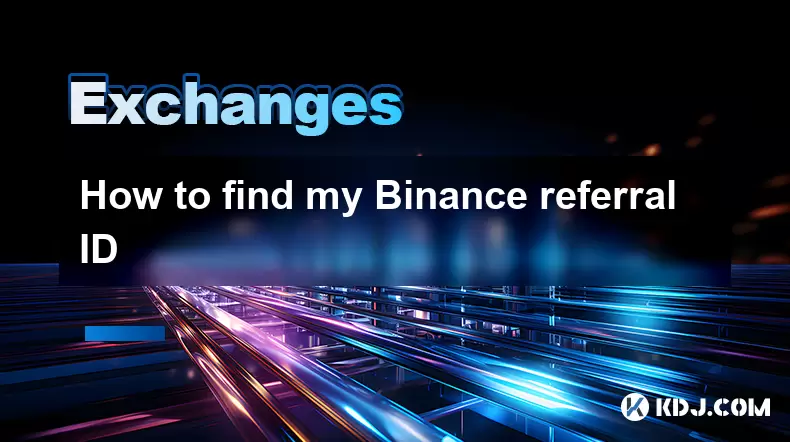
How to find my Binance referral ID
Jul 07,2025 at 06:29pm
What is a Binance Referral ID?A Binance Referral ID is a unique identifier assigned to each user on the Binance platform. This ID allows users to refer new traders to Binance and earn commissions from their trading fees. The referral program is an integral part of Binance’s ecosystem, encouraging community growth and rewarding active participants. Every...
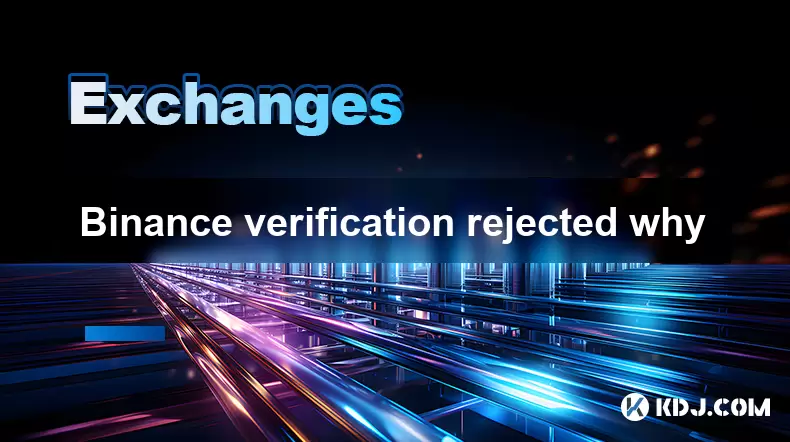
Binance verification rejected why
Jul 07,2025 at 06:57pm
Understanding Binance Verification RejectionIf your Binance verification was rejected, you're likely searching for answers on why this happened and how to resolve it. Binance, as one of the world's largest cryptocurrency exchanges, requires users to complete identity verification to comply with Know Your Customer (KYC) regulations. When a verification r...
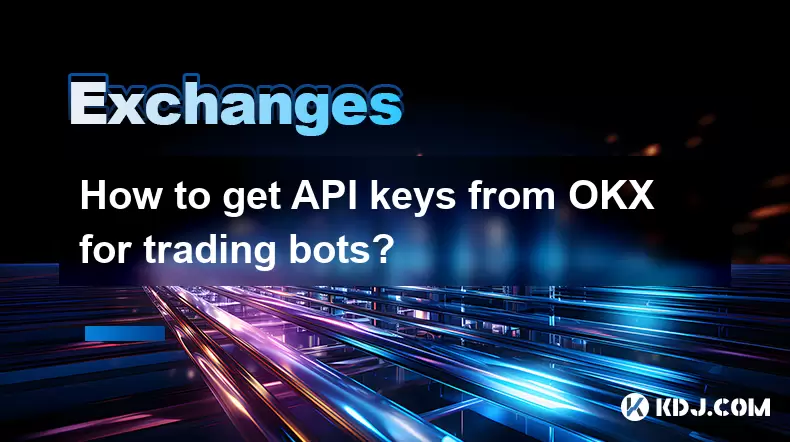
How to get API keys from OKX for trading bots?
Jul 03,2025 at 07:07am
Understanding API Keys on OKXTo interact with the OKX exchange programmatically, especially for building or running trading bots, you need to obtain an API key. An API (Application Programming Interface) key acts as a secure token that allows your bot to communicate with the exchange's servers. On OKX, these keys come with customizable permissions such ...
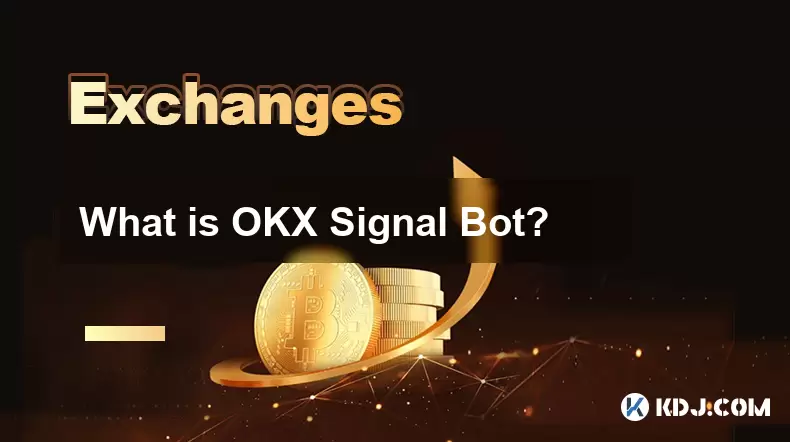
What is OKX Signal Bot?
Jul 02,2025 at 11:01pm
Understanding the Basics of OKX Signal BotThe OKX Signal Bot is a feature within the OKX ecosystem that provides users with automated trading signals and execution capabilities. Designed for both novice and experienced traders, this bot helps identify potential trading opportunities by analyzing market trends, technical indicators, and historical data. ...
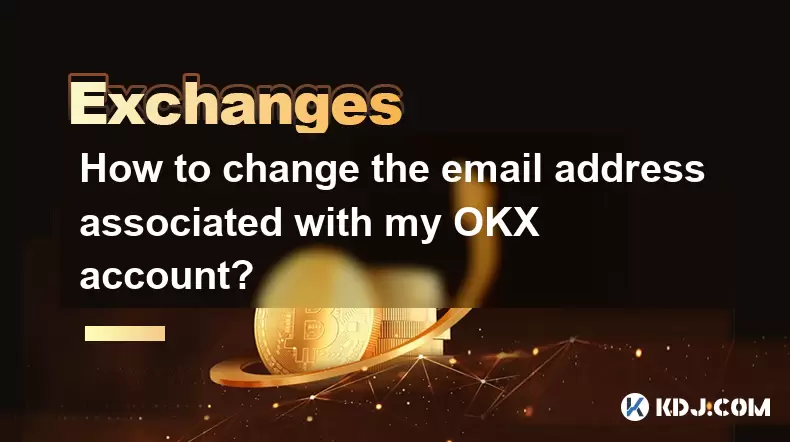
How to change the email address associated with my OKX account?
Jul 07,2025 at 08:07am
How to Change the Email Address Associated with My OKX Account?Changing the email address associated with your OKX account is a crucial process that ensures you maintain control over your digital assets and account security. Many users may find themselves needing to update their registered email due to various personal or technical reasons, such as swit...
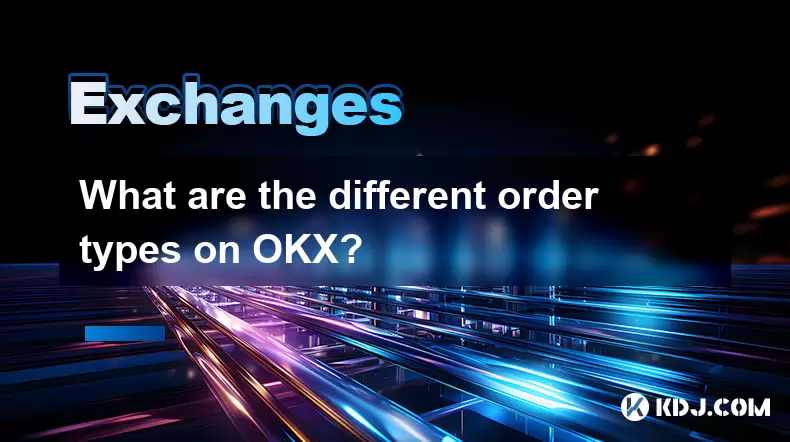
What are the different order types on OKX?
Jul 07,2025 at 08:00pm
Understanding the Market Order on OKXOn OKX, a market order allows traders to buy or sell assets at the current market price. This type of order is executed immediately because it matches with existing orders in the order book. Traders use market orders when they prioritize execution speed over price precision. Immediate Execution: The trade happens ins...

How to find my Binance referral ID
Jul 07,2025 at 06:29pm
What is a Binance Referral ID?A Binance Referral ID is a unique identifier assigned to each user on the Binance platform. This ID allows users to refer new traders to Binance and earn commissions from their trading fees. The referral program is an integral part of Binance’s ecosystem, encouraging community growth and rewarding active participants. Every...

Binance verification rejected why
Jul 07,2025 at 06:57pm
Understanding Binance Verification RejectionIf your Binance verification was rejected, you're likely searching for answers on why this happened and how to resolve it. Binance, as one of the world's largest cryptocurrency exchanges, requires users to complete identity verification to comply with Know Your Customer (KYC) regulations. When a verification r...

How to get API keys from OKX for trading bots?
Jul 03,2025 at 07:07am
Understanding API Keys on OKXTo interact with the OKX exchange programmatically, especially for building or running trading bots, you need to obtain an API key. An API (Application Programming Interface) key acts as a secure token that allows your bot to communicate with the exchange's servers. On OKX, these keys come with customizable permissions such ...

What is OKX Signal Bot?
Jul 02,2025 at 11:01pm
Understanding the Basics of OKX Signal BotThe OKX Signal Bot is a feature within the OKX ecosystem that provides users with automated trading signals and execution capabilities. Designed for both novice and experienced traders, this bot helps identify potential trading opportunities by analyzing market trends, technical indicators, and historical data. ...

How to change the email address associated with my OKX account?
Jul 07,2025 at 08:07am
How to Change the Email Address Associated with My OKX Account?Changing the email address associated with your OKX account is a crucial process that ensures you maintain control over your digital assets and account security. Many users may find themselves needing to update their registered email due to various personal or technical reasons, such as swit...

What are the different order types on OKX?
Jul 07,2025 at 08:00pm
Understanding the Market Order on OKXOn OKX, a market order allows traders to buy or sell assets at the current market price. This type of order is executed immediately because it matches with existing orders in the order book. Traders use market orders when they prioritize execution speed over price precision. Immediate Execution: The trade happens ins...
See all articles





















